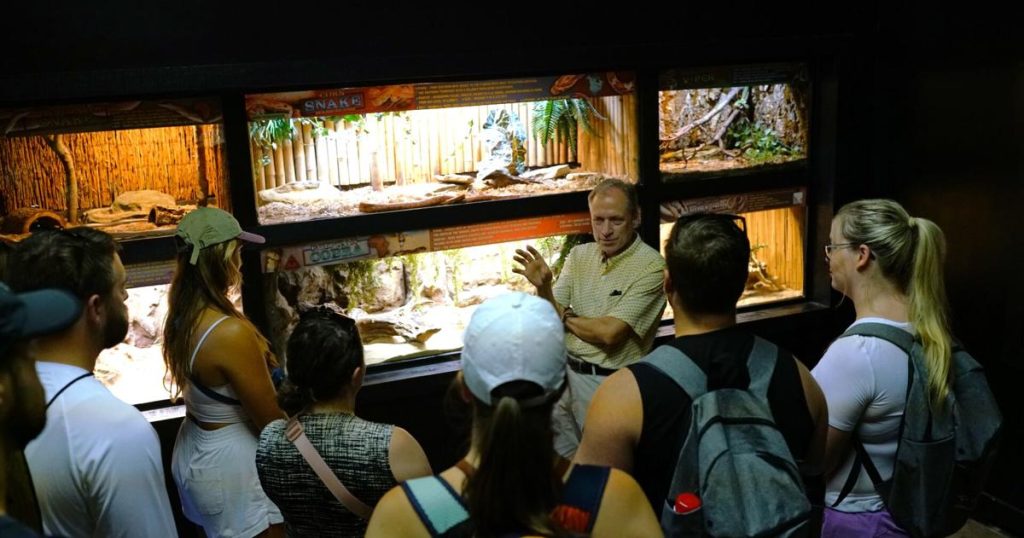Alligator Adventure's serpentarium was filled with future doctors peering into the snake enclosures to learn more about the slithering reptiles whose bites can land patients in the emergency room.
“I thought it was really interesting to see what types of snakes we might find around us and what we might see our patients come in with if they get bitten or have envenomations, how to treat and manage them and see what resources are out there in the community,” said Alina Kiley, a first-year resident in the emergency medicine program at Grand Strand Medical Center.
A dozen Grand Strand Health interns and six students auditioning for the residency got a first-hand look at the boas, pythons, cobras, water moccasins and dozens of other species of snakes that call Alligator Adventure home in North Myrtle Beach on Tuesday, July 16.
The future physicians heard from an expert in treating venomous bites, Dr. Jarratt Lark, director of toxicology, co-director of wilderness medicine and senior faculty in the Grand Strand Emergency Medicine Residency Program.
“We know that our residents need to be at least familiar with some of these snakes on a more intimate level, and part of that is being able to identify them and see what they look like,” Lark said. “And what are the characteristics that distinguish a pit viper from a cobra, which is a neurotoxic snake. So how do these patients present differently? And you can learn about some of the strategies by looking at the snakes. And so seeing the snake is instructive.”

Alligator Adventure's antivenom bank and the zoo's partnership with Grand Strand Health allow the hospital to treat dozens of snake bites each year.
Lark talked to the students about snakes that inhabit coastal Carolina, like the eastern diamondback rattlesnake, but also about non-native species like the Gaboon viper. That’s because even though species like the viper aren’t native to South Carolina, they can still be found in the state because people buy them as pets. Lark and Thad Bowan, who works in animal husbandry at Alligator Adventure, both said the state’s lax rules about owning venomous snakes make snakebites from non-native species more common than in other parts of the country.
“Right now, there are several bills in the state legislature that are trying to limit the availability of exotic venomous snakes. But right now, you can go to a reptile show in South Carolina and buy a Gaboon viper. You don’t need a license, you don’t need any expertise, you just need money,” Lark said, adding that the last time he went to a reptile show about a year ago, Gaboon vipers were selling for less than $200.
The partnership between Grand Strand Health and Alligator Adventure goes beyond allowing Grand Strand residential students to get up close and personal with different species of snakes. Alligator Adventures also shares antivenom with the hospital, which Lark said treats about 36 to 48 snake bites per year.
“Over the years we’ve developed a relationship where they have a bank of antivenom for the safety of the staff who work with the snakes here, but through cooperation with them and their owner, Jake, he’s allowed us to access that antivenom to treat envenomations from exotic snakes,” Lark said.

Alligator Adventure in North Myrtle Beach is home to approximately 50 different species of venomous and non-venomous snakes.
The fact that Grand Strand Health has access to antivenom and a staff that is well-trained to treat venomous bites makes the hospital a go-to place to treat snakebites, and Lark said because of that, the hospital sees patients from all over the state and sees more snakebite patients than most hospitals in the country.
“We've become one of the area's specialty centers for treating exotic envenomations,” Lark said, describing the hospital as “kind of a snake center” because of the availability of antivenoms.


